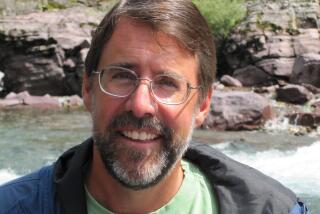Ah, Sweet Nature ... but Only If You Can Afford a Piece of It
- Share via
Sometimes nature casts a spell on you. Acquaintances talk about mystical connections to the Rocky Mountains, Michigan’s Upper Peninsula, the Gulf Stream off the Florida Keys, a hundred places. These people grew up in Chicago, New Jersey, Los Angeles, and they happened somewhere and ... well, you know their story. Lights went on. Some life-sustaining Truth was revealed.
These people talk about the vistas, the sense of space or the climate; the smell of pinon smoke, the sunsets, or the whales breaching the surface of the water. Their eyes soften. They say things like: “I’m able to clear my mind, and it helps me put it all into perspective. Problems don’t go away when we’re here, but you can see them in a different light.”
Such a man is George W. Bush. You can see it in the images of him at his ranch: the president cast in silhouette against the pale Texas sky, or the president wandering, wide-eyed and happy, up a limestone canyon. You can hear it in his words. The quote above is his.
It is the nature of nature to inspire us. It’s our ancestral home, after all. Our DNA was coded by the rhythms of the natural world long before the advent of cars, air-conditioned office buildings and the 40-hour workweek. In fact, there is plenty of good evidence that the pace and accouterments of modern life are the root cause for so many people feeling adrift nowadays: We have, in fact, departed our element.
The human desire, the need, to reengage nature periodically is one of the essential arguments for conservation in this crowded epoch. The stillness, the solitude, the escape, the renewal that one finds in the natural world is our best, and perhaps final, source of balance.
I’ve heard cynics describe Bush’s sun-scorched ranch as something of a faux cowboy prop that he uses to maintain down-to-earth distance from his old-money East Coast heritage. The truth, I think, is the opposite. These 1,600 acres are not a retreat from elitism, but rather an open-arms embrace of the most uncharitable kind of elitism: the belief that nature belongs to those who can afford it. That nature is a privilege for the privileged. That nature is another free-market commodity for high bidders.
Thus, while the president replenishes himself on his private holdings and the vice president does the same on his spread in Wyoming, their administration simultaneously has stepped up the war against conservation of our public lands and waters. I’m referring to the diminishing tracts of nature that we hold in collective trust, but which the administration does not recognize for having the same vital magic as those private ranches bought with the proceeds of corporate payouts and dealings.
In Colorado last week, the administration gave the go-ahead for expanded oil exploration at another national monument, the Canyons of the Ancients. “The people have a right to develop those areas,” the monument’s manager said. By this, she meant “the people” in the oil business. As for us other people and our yearnings for quiet, for solitude, for the perspective that nature grants us? Want some, go buy it. Or perhaps the converse: If you can’t afford it, you don’t deserve it.
Even more breathtaking, the Justice Department this month asserted that the nation’s foremost environmental law does not apply to our coastal oceans. In 1969, President Richard M. Nixon signed the National Environmental Policy Act, which requires the federal government to take into account the environmental consequences of its actions. “This is the Magna Carta of environmental law,” says Joel Reynolds of the Natural Resources Defense Council.
But the Justice Department filed a court brief insisting that U.S. territorial waters, those extending from 12 to 200 miles offshore, were exempt from environmental review. At the moment, the issue is the Navy’s pursuit of a sonar system that is so explosively loud that it may end the glorious comeback of whales. Tomorrow, perhaps the issue will be sea-floor mining or waste dumping. Who knows the consequences? The administration says it’s not required to look.
For millions of Americans, our ocean waters, our national monuments, our public forests and grasslands and wilderness parks provide our indispensable connections to nature, just as those private ranches serve Bush, Cheney and other monied elites, or for that matter non-elites who actually work the land.
Recently, the president greeted a sunrise over his wilderness of oaks and cedar elms. He spread his arms and intoned, “Thanks to the good Lord.” On a private ranch, that will suffice. The rest of us sorely need more down-to-earth stewardship. Instead of widespread development and step-by-step retreats on environmental protections, our holdings deserve the respect our chief executive gives his own, and for the very same reasons.


